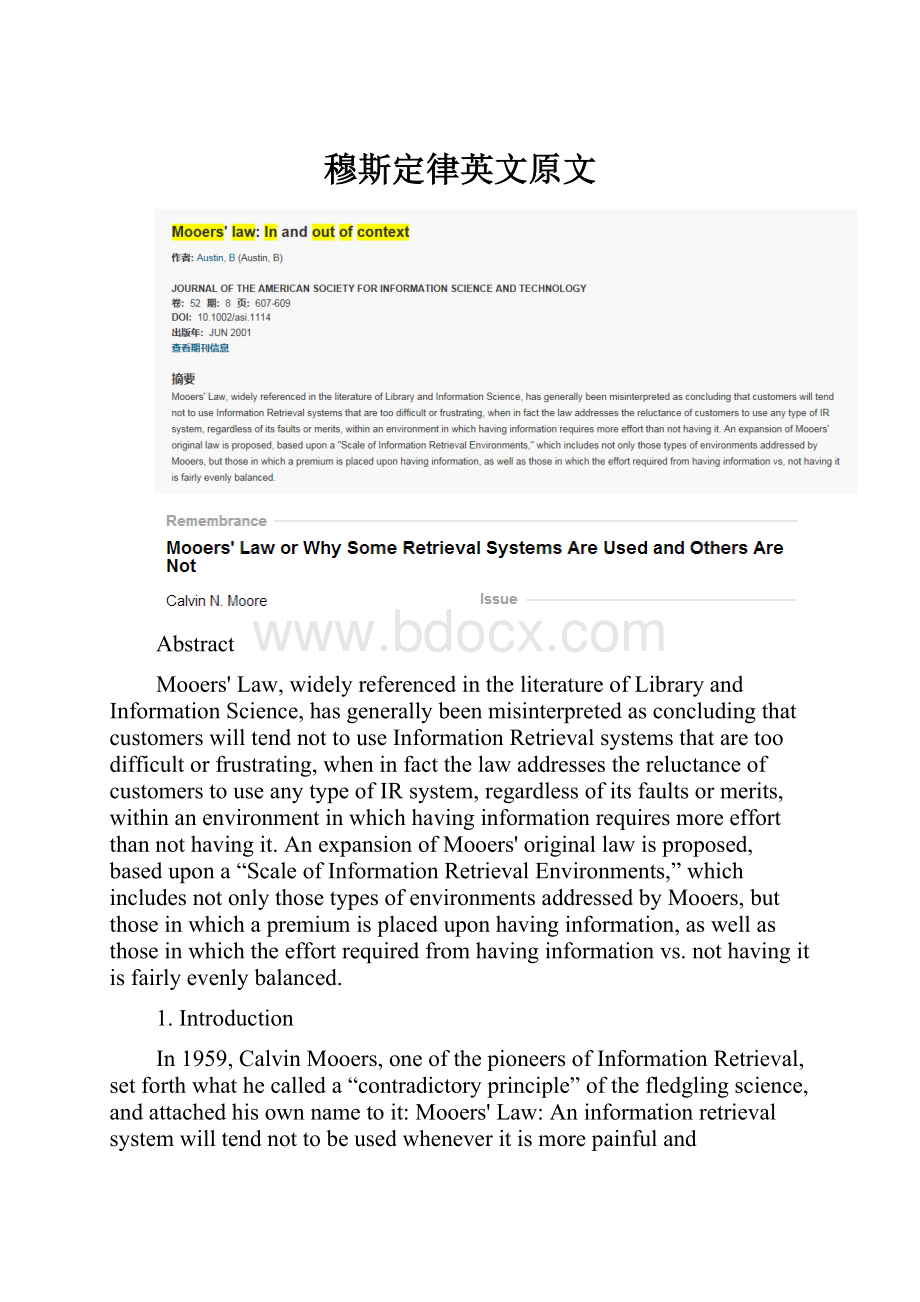穆斯定律英文原文.docx
《穆斯定律英文原文.docx》由会员分享,可在线阅读,更多相关《穆斯定律英文原文.docx(7页珍藏版)》请在冰豆网上搜索。

穆斯定律英文原文
Abstract
Mooers'Law,widelyreferencedintheliteratureofLibraryandInformationScience,hasgenerallybeenmisinterpretedasconcludingthatcustomerswilltendnottouseInformationRetrievalsystemsthataretoodifficultorfrustrating,wheninfactthelawaddressesthereluctanceofcustomerstouseanytypeofIRsystem,regardlessofitsfaultsormerits,withinanenvironmentinwhichhavinginformationrequiresmoreeffortthannothavingit.AnexpansionofMooers'originallawisproposed,basedupona“ScaleofInformationRetrievalEnvironments,”whichincludesnotonlythosetypesofenvironmentsaddressedbyMooers,butthoseinwhichapremiumisplaceduponhavinginformation,aswellasthoseinwhichtheeffortrequiredfromhavinginformationvs.nothavingitisfairlyevenlybalanced.
1.Introduction
In1959,CalvinMooers,oneofthepioneersofInformationRetrieval,setforthwhathecalleda“contradictoryprinciple”ofthefledglingscience,andattachedhisownnametoit:
Mooers'Law:
Aninformationretrievalsystemwilltendnottobeusedwheneveritismorepainfulandtroublesomeforacustomertohaveinformationthanforhimnottohaveit(Mooers1959b,p.1).
Sincethattime,hislawhasbeenwidelyreferenced,especiallyinrecentyearsasInformationRetrievalhasbecomemorecentraltooursocietyandourindividuallives;aby-no-meansexhaustivesurveyoftheWorldWideWebandtheliteratureofvariousdisciplines(Business,Education,ComputerScience,andLibraryScience)revealsseveraldozencitationsfromthelastdecadealone.AninterestingthinghashappenedtoMooers'Law,however,alongthewaytoacceptance:
thelawthatisbecomingwidelyheldastruebyinformationprofessionalsisnotthesameonethatMr.Mooersproposed.
Thedifferencebetweentheactuallawanditsmutationcentersspecificallyuponamisinterpretationoftheword“have,”amisinterpretationwhichperhapsresultsprimarilyfromreadingthelawexcerptedfromtheoriginalarticleinwhichitappeared,andapplyingittoaconcernthatisdistinctlyseparatefromtheoneMr.Mooerswasattemptingtoaddress.Whatfollows,then,isanefforttocompareandcontrastwhatarereallytwoverydifferentMooers'Laws,whichforthepurposesofthisdiscussionwillbecategorizedas“In”and“Outof”context.
2.TheLawinContext
Mr.MooersoriginallyproposedhislawduringapaneldiscussionattheAnnualMeetingoftheAmericanDocumentationInstituteatLehighUniversityinOctober1959;theremarkshemadetherewere“excerpted,withmodifications”fromhisInformationRetrievalSelectionStudy,PartII:
SevenSystemModels,writtenearlierthatsameyear.ThelawthenappearedinprintasabriefpaperinZatorTechnicalBulletin136inDecember,andasaneditorialthenextyearinAmericanDocumentation(1960).Morerecently,ithasbeenreprintedinTheScientist,bothinpaperformatandonline(1997).
Mooers'Law,asheexplainsit,focusesonthe“painfulandtroublesome”aspectsofhavinginformationinhandandthereforefeelingobligatedtodosomethingwithit;inhisestimation,givenwhathecallsthe“presentintellectualandengineeringclimate”(1959b,p.1),thecustomermightjustaswellwishnottohavetheinformation,evenifitisreadilyavailable.For,henotes,“Ifyouhaveinformation,youfirstmustreadit,whichisnotalwayseasy.Youmustthentrytounderstandit.Todothis,youmayhavetothinkaboutit”(1959b,p.2).InMr.Mooers'ownwords,whatheissettingforthisa“principle…ofbehavior”(1959b,p.1),andhisconcerniswithchangingaclimateinwhichthatbehaviorismoreoftenrewardedthanpunished.Theabilityofaninformationretrievalsystemquicklyandefficientlytoplaceinformationinthecustomer'shandsisnottheissue;indeed,thatiswhatMr.Mooersislamenting.
Inthebuildingandplanningofourinformationhandlingandretrievingsystems,wehavetendedtobelieveimplicitly,andtoassumethroughout,thathavinginformationeasilyavailablewasalwaysagoodthing,andthatallpeoplewhohadaccesstoaninformationsystemwouldwanttousethesystemtogettheinformation.Itisnowmysuggestionthatmanypeoplemaynotwantinformation,andthattheywillavoidusingasystempreciselybecauseitgivestheminformation[emphasisinoriginal].(1959b,pp.1–2)
InhisoriginalSevenSystemModelsstudy,hegoesevenfurther,settingforththefollowingasacorollarytohisas-yet-unnamedprinciple:
“Whereaninformationretrievalsystemtendsnottobeused,amorecapableinformationretrievalsystemmaytendtobeusedevenless”(1959a,p.34).ThisisnotonlydifferentfromtheMooers'Lawthatappearssofrequentlyintheliteratureoftoday,butgivenaparticular“intellectual…climate”suchastheonehedescribes,distinctlyatoddswithit.
.TheLawoutofContext
Mooers'Law,asitisnowpopularlyperceivedamongwhatmightbetermedthe“InformationCommunity”,focusesupontheeffortthattheuserofaretrievalsystemmustputforthtoacquirethedesiredinformation.J.MichaelPemberton,ostensiblyquotingMooers,hasrestatedthissuccinctlyasfollows:
“Themoredifficultandtimeconsumingitisforacustomertouseaninformationsystem,thelesslikelyitisthathewillusethatinformationsystem”(1989,p.46).RogerK.Summit,ChairmanEmeritusofDIALOGInformationServices,phrasesitanotherway:
“Mooers'lawtellsusthatinformationwillbeusedindirectproportiontohoweasyitistoobtain”(1993,p.16).
Thisinterpretationofthelawisgenerallyusedasacautionarytaletothosewhowouldprovideaccesstoinformation:
Ifyoubuildit,andmakeittoohard,theywillnotcome.Toanyonewhohasusedadifficultsearchengineordatabaseinterface,thishastheringoftruthtoit,andthatmaybewhyMooers'Law,onceremovedfromitsoriginalcontext,hasresonatedontheInternetandwithintheliteratureofInformationScience.Here,itseems,istheoriginalarticulationofmanyofourcurrentfrustrations.Althoughthosefrustrationsmayindeedbevalid,theyarenotthesameonesthatledMr.Mooerstocomposehis“contradictoryprinciple”:
theInformationCommunityoftoday(andyesterdayaswell,accordingtoMooers)assumesthatuserswantinformationandwouldacquireitifitwereeasyenoughtoobtain;hereflectsthat,sadly,thismaynotalwaysbethecase(1959a,p.1).
Bothconcerns—thatcustomerswillnotuseIRsystemsbecausehavingtheinformationistoomuchtroubleandbecausegettingtheinformationistoomuchtrouble—areultimatelybehavioralinnature,andbothadheretowhatEstherG.Bierbaumsetsforthasa“unifyingprinciple”forlibraryandinformationscience(1990,p.18),namelyZipf's“PrincipleofLeastEffort”,whichcontends“thattheentirebehaviorofanindividualisatalltimesmotivatedbytheurgetominimizeeffort”(1949,p.3),buttheyareclearlyseparateproblems,withseparatesolutions.We,thatis,theInformationCommunityoftoday,assumethatthereisatechnicalsolutiontoourconcern:
ifwecanbuildsystemsthatarefaster,moreintuitive,andprovidethecustomerwithresultsthatmorenearlymatchwhatheorsherequested,thenthosesystemswillbeheavilyused.Mooerssuggeststhatthesolutiontohisconcernliesinchangingtheculturethatcreatedit,andacknowledgesthatthisis“noeasytask”(1959a,p.39).Again,itisimportanttoemphasizethatthissolutionliesoutsidetherealmofhardwareandsoftware;intheconclusionofhisSevenSystemModelsstudy,Mooersclearlystatesthat,inaculturesuchastheonehedescribes,“theamountofuseofaretrievalsystemdependsupontheintellectualenvironmentorsocialclimatesurroundingthesystem,andnotuponthefaultsormeritsofthesystemitself”(1959a,p.39).
4.TheContextofEnvironment
Mooersacknowledgesthathislaw,iftrue,isa“pessimistic…evenacynicalconclusion”(1959a,p.32,1959b,p.1),andatfirstglancesuchaconclusionwouldseemtopainthisentirecareer,andthoseofothersinthefield,asafutileendeavor,butforthefactthatthelawisrestrictedtocertain“userenvironments”(1959a,p.2).Thisturnsouttobeanimportantpoint.ThespecificenvironmentthatMooerswasaddressingwasonethathebelievedexistedwithin“manycompanies,laboratories,andagencies”ofhisday,anenvironmentinwhich“rewards,insteadofpunishment,gowithnotusinginformation”(1959b,pp.1–2).Heacknowledges,however,that“therearesituationswherethediligentfindinganduseofinformationisstressedandrewarded,andwherefailuretofindortouseinformationisseverelypunished”andnotesthat“insuchplaces,wecanexpectretrievalsystemswillbeactivelyused”(1959b,p.2).InhisSevenSystemModelsstudy,hecites“thebestofthechemicalorpharmaceuticallaboratories”asexamplesofthistypeofenvironment,onesinwhich“management…iswellawareofthedollarcostsandlegalhazardsofnotmakinguseofinformation”(1959a,p.33).Earlierinthesamestudy,hepointsoutthat,inanenvironmentsuchasthis,“wheretheneed[forinformation]ishighenough”even“fundamentallypoorsystemsmaybewellused”(p.5).
Basedontheseobservations,then,whatmightbetermedaScaleofInformationRetrievalEnvironmentssuggestsitself.Ononeendofthescalethereareenvironmentsinwhichitisfarmorepainfultohaveinformationthantonothaveit;ontheotherend,theexactoppositeistrue.Whatisinterestingabouttheseextremesofthescaleisthatineithercase,atleasttheoretically,theperformanceoftheIRsystemwillnotaffecttheamountofitsusesinceintheonenoimprovementsindesignorefficiencywillenticetheusertoacquireinforma